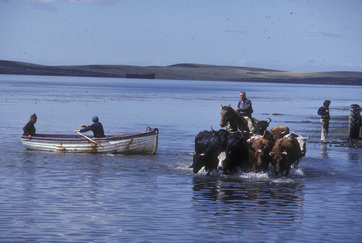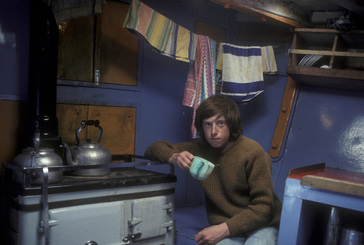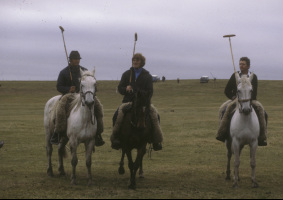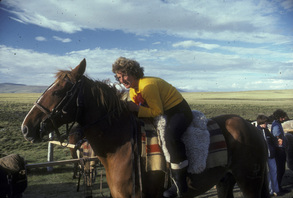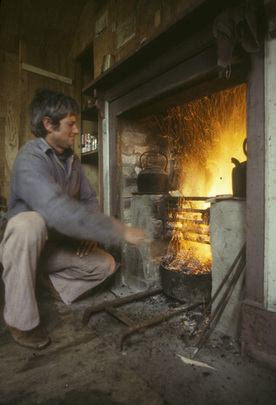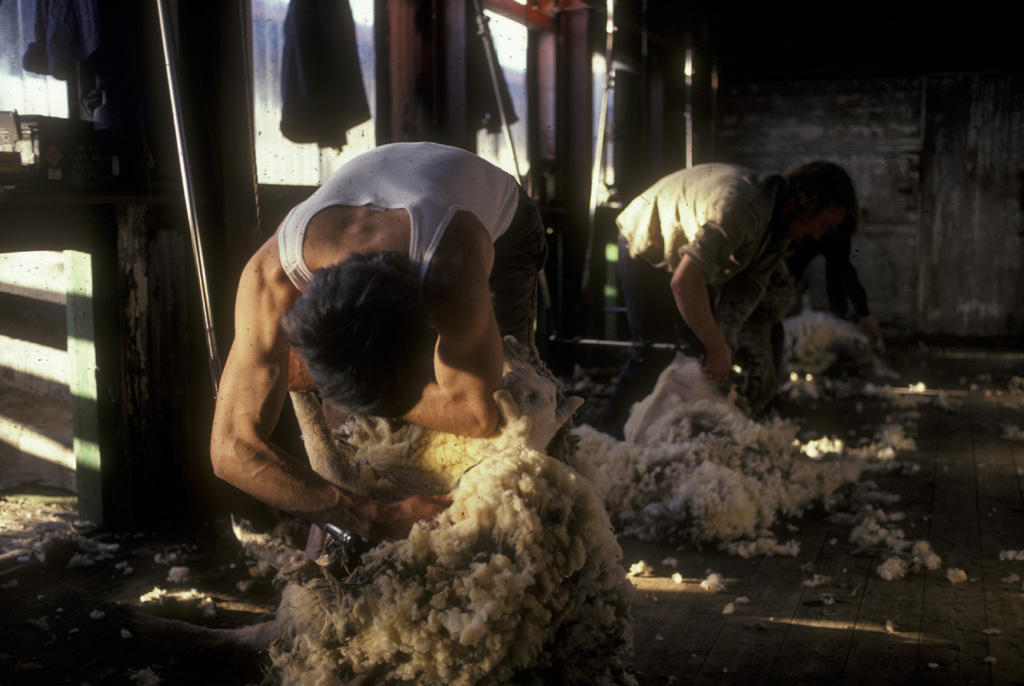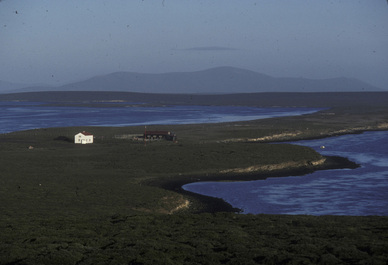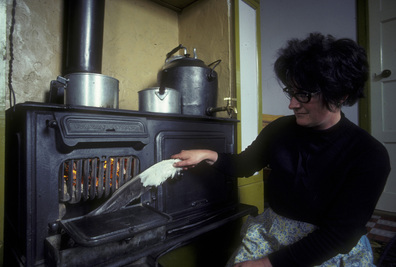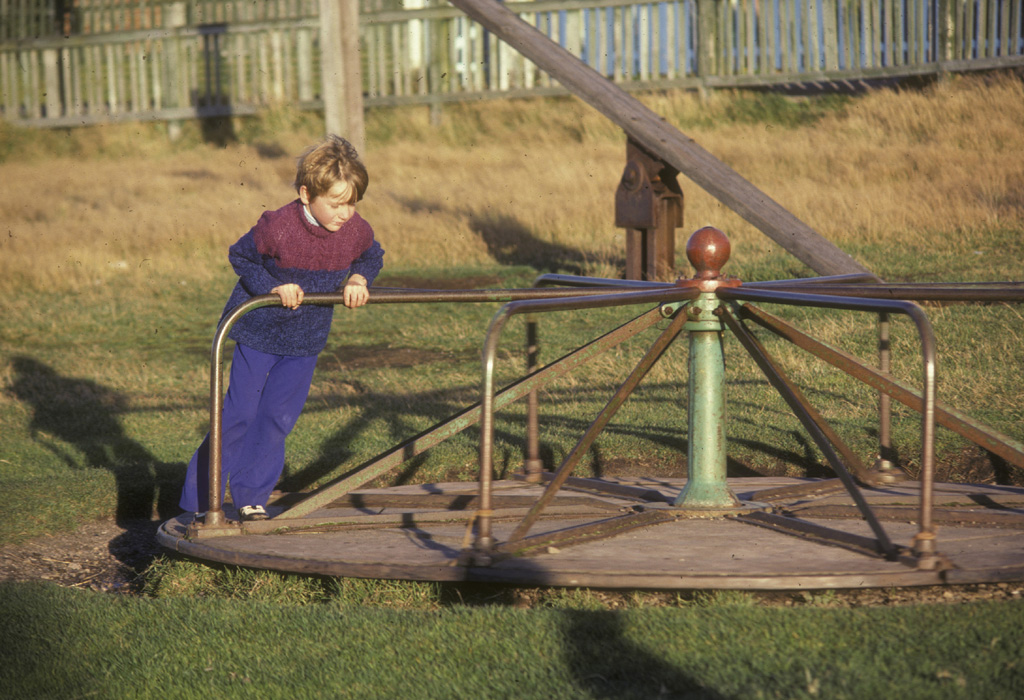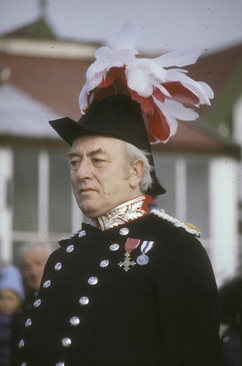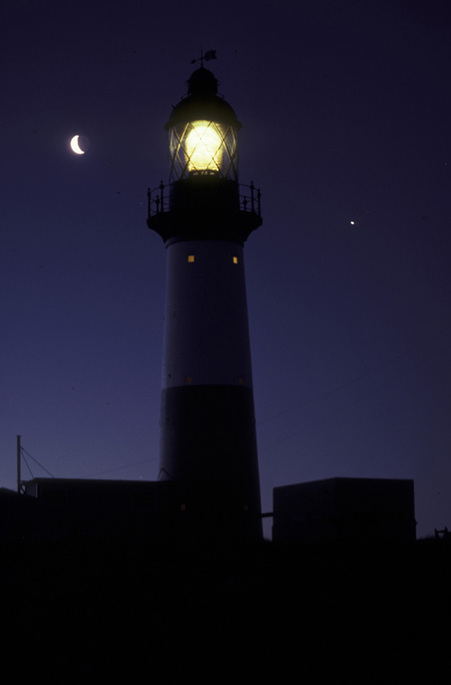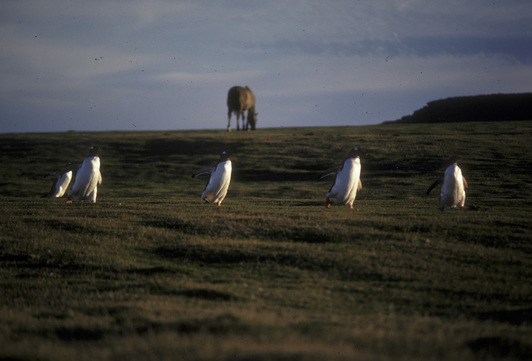A Lonely But Free Life At the Southern Edge of the World
The Falkland Islands are about as remote as a place can be, but most who live there wouldn't want to be anywhere else.
by Fred Strebeigh
Originally published Smithsonian, September 1981, with photographs by Fred Strebeigh and Martin Rogers.
All photographs in this online version are by Fred Strebeigh.
(The Falklands were invaded by Argentina on April 2, 1982. For the article I wrote for
the op-ed page of the New York Times, April 6, 1982, please click here.)
Originally published Smithsonian, September 1981, with photographs by Fred Strebeigh and Martin Rogers.
All photographs in this online version are by Fred Strebeigh.
(The Falklands were invaded by Argentina on April 2, 1982. For the article I wrote for
the op-ed page of the New York Times, April 6, 1982, please click here.)
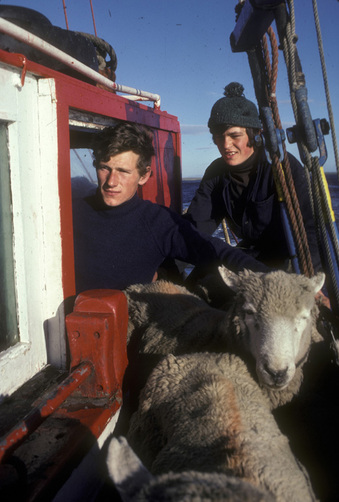
Skipper Stephen Clifton (left) and crewman Ian McKay, on ketch Ilen.
The ketch Ilen purls over seas flecked with sunlight, brindled with kelp. Cape Horn lies off our bow, 450 miles southwest. On deck and in the hold, huddling from the chill wind, some 200 sheep are packed tight as crated grapefruit. Dolphins play beneath the bowsprit. Magellanic penguins swim in our wake. Mariners for centuries have dreaded these stormy latitudes, below the 50th parallel, which they call "the furious 50s." Here the west winds, hitting almost no land, whirl virtually unimpeded around the globe.
This old ketch will never reach Cape Horn. Today, the skipper tells me, we "shift sheep." Tomorrow, "gather bullock." Ship and crew are at home here, coasting the twisted islets and inlets of the Falkland Islands, the largest remaining colony of the old British Empire in the world.
In size, the Falklands are equivalent to Connecticut, but splattered as two large islands, East and West Falkland, and 200 smaller ones. No ferries link the islands. No paved roads cross them. Three little planes provide the only service for travel over water or distance. Flights to the islands come but once or twice a week from Argentina, the islands' only geographical neighbor--called by many simply "the coast." No direct passenger service, ship or plane, ever comes from England--which most Falklanders, even natives for many generations, quite incongruously still call "home."
The Falklands, with only 1,800 people, more than half of whom live in the capital town of Stanley, have fewer inhabitants per square mile than the state of Alaska. But though vast and often rugged, the Falkland landscape is pastoral almost to its last acre. "Everything in the islands," people will say, referring to imported necessities that range from Land-Rovers to hospital supplies to Guinness Stout, "has to come off the backs of the same 640,000 sheep."
The sheep do the job. Exporting almost nothing but raw wool, the islands maintain a phenomenal trade surplus. In some recent years wool sales have exceeded the cost of all imports by more than two to one--a ratio usually achieved only by oil-producing nations. But this is no oasis for wool sheiks. lost land is owned in Britain. Large profits leave the islands. What remains is a scant population, hard-working and self-reliant.
This old ketch will never reach Cape Horn. Today, the skipper tells me, we "shift sheep." Tomorrow, "gather bullock." Ship and crew are at home here, coasting the twisted islets and inlets of the Falkland Islands, the largest remaining colony of the old British Empire in the world.
In size, the Falklands are equivalent to Connecticut, but splattered as two large islands, East and West Falkland, and 200 smaller ones. No ferries link the islands. No paved roads cross them. Three little planes provide the only service for travel over water or distance. Flights to the islands come but once or twice a week from Argentina, the islands' only geographical neighbor--called by many simply "the coast." No direct passenger service, ship or plane, ever comes from England--which most Falklanders, even natives for many generations, quite incongruously still call "home."
The Falklands, with only 1,800 people, more than half of whom live in the capital town of Stanley, have fewer inhabitants per square mile than the state of Alaska. But though vast and often rugged, the Falkland landscape is pastoral almost to its last acre. "Everything in the islands," people will say, referring to imported necessities that range from Land-Rovers to hospital supplies to Guinness Stout, "has to come off the backs of the same 640,000 sheep."
The sheep do the job. Exporting almost nothing but raw wool, the islands maintain a phenomenal trade surplus. In some recent years wool sales have exceeded the cost of all imports by more than two to one--a ratio usually achieved only by oil-producing nations. But this is no oasis for wool sheiks. lost land is owned in Britain. Large profits leave the islands. What remains is a scant population, hard-working and self-reliant.
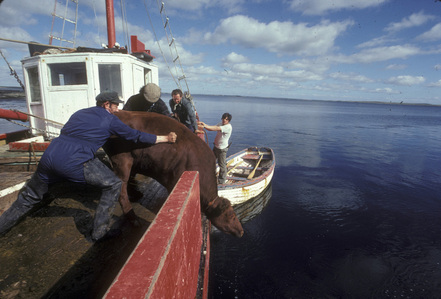
Captain Finley Ferguson (left) of ketch Penelope urges bullock to swim to an island pasture
The four-man crew of the Ilen, joining sometimes with another four-man ketch, tends 18,000 sheep on 60 islands along the south shore of East Falkland--all owned by the Falkland Islands Company, largest of the British farm companies holding land in the colony. The Ilen crew lives on ship or in shanties. Often for as long as six weeks they do not see their home port, Goose Green, population 140. They shear and butcher sheep, herd and slaughter cattle, mend fences and boats. Working 12 hours a day, they earn overtime and spend almost nothing. As their skipper, Stephen Clifton, says, "It's a free sort of life."
Though in command of Ilen for two years, Stephen still looks less like a seasoned sailor than a ruddy-faced schoolboy--perhaps because he became skipper at age 16. The islands have more work than people, an unemployment rate that in effect runs below zero, and so, as Stephen says, "men are hard to come by."
Though in command of Ilen for two years, Stephen still looks less like a seasoned sailor than a ruddy-faced schoolboy--perhaps because he became skipper at age 16. The islands have more work than people, an unemployment rate that in effect runs below zero, and so, as Stephen says, "men are hard to come by."
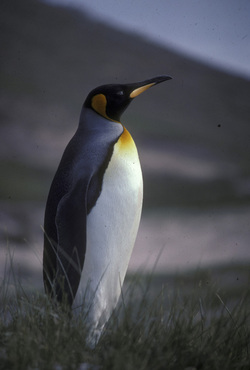
King penguin in land of 10 million penguins
Stephen and his seagoing shepherds travel a coast that remains almost as undeveloped as when the first man discovered it--a man presumably European. Native Americans never inhabited these islands. A British explorer, John Strong, made the first landing in 1690. Putting ashore to "inspect the inhabitants," his crew found penguins, "mustered in infinite numbers" (hardly an exaggeration: the present population exceeds ten million).
France made the first settlement in 1764. British settlers came the next year. Spain bought out the French and then in 1770, with five frigates, threw out the British. After Spain's empire crumbled, Argentina inherited its hold on the islands, known in Spanish as the "Islas Malvinas." In 1833 the British took the islands back, beginning a 150--year dispute with Argentina over their sovereignty--which conceivably could pass to Argentina as a result of negotiations now being held between the two nations.
In any event, the pattern that today defines life in the Falklands was cut in their early years. Now, as then, the population is almost totally British, and almost totally separated, by both language and politics, from the continent that lies only 250 miles away. Bound intimately to their own land and emotionally to Britain, linked but tenuously to the rest of the world, Falklanders have learned to do for themselves. Every Falkland woman is her own butcher, each man his own car mechanic. Families and friends make their own fun. Social problems are almost nonexistent.
"People here," says Stephen Clifton, "don't know what it is to have television sets or nightclubs. Saying is: 'What you never have, you never miss.'"
Other things not missed in the Falklands are, by and large, traffic jams or pollution or social unrest. No one goes hungry or cold, especially in the farm communities, where meat, milk and housing are free for all; home-heating fuel comes free also, cut from peat bogs, dried and burned.
France made the first settlement in 1764. British settlers came the next year. Spain bought out the French and then in 1770, with five frigates, threw out the British. After Spain's empire crumbled, Argentina inherited its hold on the islands, known in Spanish as the "Islas Malvinas." In 1833 the British took the islands back, beginning a 150--year dispute with Argentina over their sovereignty--which conceivably could pass to Argentina as a result of negotiations now being held between the two nations.
In any event, the pattern that today defines life in the Falklands was cut in their early years. Now, as then, the population is almost totally British, and almost totally separated, by both language and politics, from the continent that lies only 250 miles away. Bound intimately to their own land and emotionally to Britain, linked but tenuously to the rest of the world, Falklanders have learned to do for themselves. Every Falkland woman is her own butcher, each man his own car mechanic. Families and friends make their own fun. Social problems are almost nonexistent.
"People here," says Stephen Clifton, "don't know what it is to have television sets or nightclubs. Saying is: 'What you never have, you never miss.'"
Other things not missed in the Falklands are, by and large, traffic jams or pollution or social unrest. No one goes hungry or cold, especially in the farm communities, where meat, milk and housing are free for all; home-heating fuel comes free also, cut from peat bogs, dried and burned.
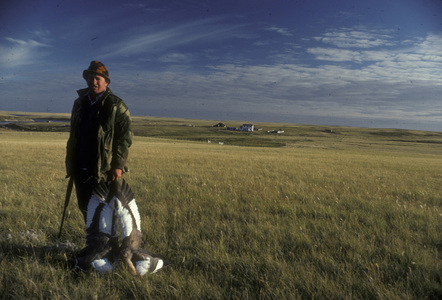
Tony Blake and Upland Geese, North Arm
The Ilen docks at Goose Green and I meet Tony Blake, an energetic New Zealander with eyes so blue the sky seems to shine through them. Within an hour, at his invitation, we are driving toward North Arm, the East Falkland farm he manages for the Falkland Islands Company.
"This is the smoothest camp driving in the Falklands," he says as his four-wheel-drive Land-Rover lurches onto the beaten tracks heading south. The "camp," taken from campo, Spanish for countryside, is everything beyond the town of Stanley and its 20 miles of paved roads. "North Arm is 30 miles from here--only three hours," says Tony, seeking a smooth path through the rough fields.
Before coming to the Falklands in 1972, Tony worked as a farmer and agricultural lecturer in New Zealand, the world's number-two exporter of wool, after Australia. Why move to the Falklands?
"I wanted to run a big farm," he says. "At home a typical place is 1,000 acres. Here I've got 67,000 sheep on 307,000 acres."
We halt for a flock of upland geese, the tastiest of Falkland wildfowl, and apparently even more numerous than sheep. With two shotgun blasts, Tony bags five birds. The rest of the flock doesn't fly away. They stroll. "Amazing," says Tony. "But with so few people there's almost no hunting pressure."
"This is the smoothest camp driving in the Falklands," he says as his four-wheel-drive Land-Rover lurches onto the beaten tracks heading south. The "camp," taken from campo, Spanish for countryside, is everything beyond the town of Stanley and its 20 miles of paved roads. "North Arm is 30 miles from here--only three hours," says Tony, seeking a smooth path through the rough fields.
Before coming to the Falklands in 1972, Tony worked as a farmer and agricultural lecturer in New Zealand, the world's number-two exporter of wool, after Australia. Why move to the Falklands?
"I wanted to run a big farm," he says. "At home a typical place is 1,000 acres. Here I've got 67,000 sheep on 307,000 acres."
We halt for a flock of upland geese, the tastiest of Falkland wildfowl, and apparently even more numerous than sheep. With two shotgun blasts, Tony bags five birds. The rest of the flock doesn't fly away. They stroll. "Amazing," says Tony. "But with so few people there's almost no hunting pressure."
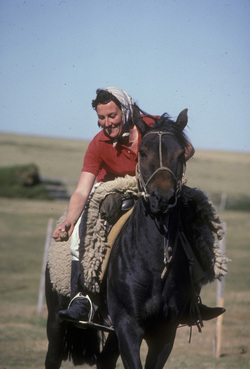
Lyn Blake, North Arm
We halt for a flock of upland geese, the tastiest of Falkland wildfowl, and apparently even more numerous than sheep. With two shotgun blasts, Tony bags five birds. The rest of the flock doesn't fly away. They stroll. "Amazing," says Tony. "But with so few people there's almost no hunting pressure."
Cresting a rise, we come on North Arm settlement, some 30 houses and sheds strung along a narrow estuary. Above the settlement stands Tony's 24-room home. "They say the Victorian era is over," he says, "but the manager still has the big house on the hill." Over dinner, Tony and his wife, Lynn, reflect on the role of farm manager. "People hold you up as a paternal figure and come to you with every problem," says Tony, "from filling in their taxes to marrying them to sending emergency medical messages over the radio to Stanley." The government provides each farm manager with a radio-telephone, obliging his family to pass on, and be privy to, most urgent settlement transactions.
Besides radio, the only rapid communication is along the telephone line--a single low-fidelity strand of steel fencing wire, which runs from North Arm through three other settlements and some 60 phones. With such party lines, Falklanders can raise eavesdropping to an art. The most clever of them wire the telephone line to their transistor radios, allowing them to turn their neighbors' conversation into family entertainment.
This loss of privacy can, of course, be annoying. Tony and others tell a story of one farm manager, bedeviled by eavesdroppers, who plugged his telephone line into a 240-volt wall socket. Across the island, the story goes, radio speakers burst like popcorn.
Cresting a rise, we come on North Arm settlement, some 30 houses and sheds strung along a narrow estuary. Above the settlement stands Tony's 24-room home. "They say the Victorian era is over," he says, "but the manager still has the big house on the hill." Over dinner, Tony and his wife, Lynn, reflect on the role of farm manager. "People hold you up as a paternal figure and come to you with every problem," says Tony, "from filling in their taxes to marrying them to sending emergency medical messages over the radio to Stanley." The government provides each farm manager with a radio-telephone, obliging his family to pass on, and be privy to, most urgent settlement transactions.
Besides radio, the only rapid communication is along the telephone line--a single low-fidelity strand of steel fencing wire, which runs from North Arm through three other settlements and some 60 phones. With such party lines, Falklanders can raise eavesdropping to an art. The most clever of them wire the telephone line to their transistor radios, allowing them to turn their neighbors' conversation into family entertainment.
This loss of privacy can, of course, be annoying. Tony and others tell a story of one farm manager, bedeviled by eavesdroppers, who plugged his telephone line into a 240-volt wall socket. Across the island, the story goes, radio speakers burst like popcorn.
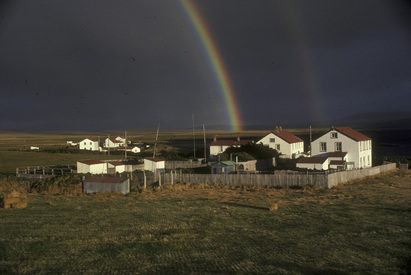
Chartres settlement, host for West Falklands Sports
Though phone and radio offer some break in the solitude of Falkland camp life, the great break comes once each year at the week-long sports meetings held at one farm on each large island at the end of summer. I set off by plane, flying over dark sea and then treeless plains to Chartres settlement, host to this year's West Falkland sports. When I arrive, half the island population of 360 has already gathered above the settlement by a rough racecourse. Old men and 12-year-olds press to the window of a ramshackle betting stall, posting wagers. Shepherds and managers, women and men, brothers and daughters hurtle down the course on all the horses they can find.
Darkness comes. We all troop down from the races to dinner. At their home, Bill and Pat Luxton, managers and part owners of Chartres farm, have 27 guests. Everyone sets tables, washes dishes, makes beds.
In the mornings we are awakened for gin and tonics before breakfast. Then come sheep-dog trials, footraces, shearing contests, steer riding.
Everyone is exhausted but each night we dance. The woolshed, its wooden shearing floor polished by hard boots for decades, is the ballroom. Yards of burlap that some day will wrap wool for shipment now cloak walls and ceiling. Stored on the floor above our heads, filling the dance hall with the rich aroma of lanolin, sit 30 tons of loose wool. We dance as if within an enormous bale, dimly lit.
Saturday arrives and everyone bids farewell to friends they may not see until the next sports. The approaching winter brings isolation. The temperature in the Falklands rarely goes below freezing and there is little snow, but the slight winter sunshine fails to dry the porous peat soil of the camp. Overland travel becomes tortuous and rare.
Darkness comes. We all troop down from the races to dinner. At their home, Bill and Pat Luxton, managers and part owners of Chartres farm, have 27 guests. Everyone sets tables, washes dishes, makes beds.
In the mornings we are awakened for gin and tonics before breakfast. Then come sheep-dog trials, footraces, shearing contests, steer riding.
Everyone is exhausted but each night we dance. The woolshed, its wooden shearing floor polished by hard boots for decades, is the ballroom. Yards of burlap that some day will wrap wool for shipment now cloak walls and ceiling. Stored on the floor above our heads, filling the dance hall with the rich aroma of lanolin, sit 30 tons of loose wool. We dance as if within an enormous bale, dimly lit.
Saturday arrives and everyone bids farewell to friends they may not see until the next sports. The approaching winter brings isolation. The temperature in the Falklands rarely goes below freezing and there is little snow, but the slight winter sunshine fails to dry the porous peat soil of the camp. Overland travel becomes tortuous and rare.
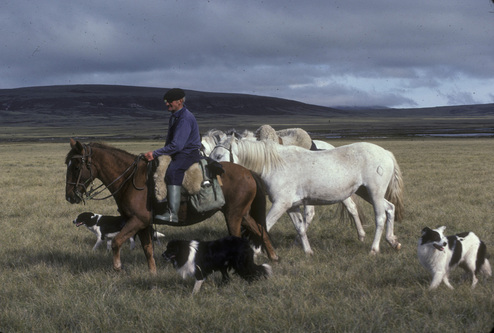
Sue Binnie on a sheep gather, Fox Bay West
From Chartres, I went south to Fox Bay to meet a man whom everyone calls "Old Sue."
"He's a real gentleman and the last of the old-time Falklanders," said one shepherd at the sports. "When he was a boy you were worked like dogs, and he doesn't know times have changed."
Horace "Sue" Binnie is an outside shepherd, one of a dwindling number who choose to live and tend pastures far outside the island settlements. Though employed by farm companies, they work beyond the gaze of managers--"pretty much your own boss," they say. I looked forward to meeting Sue, at least in part because Falkland lore seems to hold a special place for the outside shepherds. Remote and self-sufficient, long on old stories but short on new listeners, caring for the land of someone else as if it were their own, utterly free within narrow limits--the outside shepherds seem a bit like the islands themselves.
"Sue and his wife Rosie," one man told me with evident admiration, "haven't left West Falkland since World War II." I met them over tea at their home, Coast Ridge House, a miniature settlement with stables, cow shed, meat house and garden. Sue said he was off the next day to gather sheep, and asked if I would like to come.
From rough hillsides and lush swales we round up some 4,300 sheep, then drive them meandering before us, back toward Fox Bay. The day grows warm, the flock sluggish. Sue's dogs are sure how fast a drive should travel. As it slows they move in, barking at heels and ignoring shepherd's orders. Sue keeps rocks in his shirt pocket and, when words fail, he throws them at his wayward dogs. He aims to miss. They cower, feigning contrition. Both sides understand.
We rode on, talking. Just before we parted, I asked Sue if he ever wanted to see places beyond West Falkland. "No," he said instantly. Then he changed his mind. "One thing I'd love to see is some of the great concert halls. 'We get good reception here on the radio, but I think I'd like to be there. And I'd like to see a real good opera singer."
"He's a real gentleman and the last of the old-time Falklanders," said one shepherd at the sports. "When he was a boy you were worked like dogs, and he doesn't know times have changed."
Horace "Sue" Binnie is an outside shepherd, one of a dwindling number who choose to live and tend pastures far outside the island settlements. Though employed by farm companies, they work beyond the gaze of managers--"pretty much your own boss," they say. I looked forward to meeting Sue, at least in part because Falkland lore seems to hold a special place for the outside shepherds. Remote and self-sufficient, long on old stories but short on new listeners, caring for the land of someone else as if it were their own, utterly free within narrow limits--the outside shepherds seem a bit like the islands themselves.
"Sue and his wife Rosie," one man told me with evident admiration, "haven't left West Falkland since World War II." I met them over tea at their home, Coast Ridge House, a miniature settlement with stables, cow shed, meat house and garden. Sue said he was off the next day to gather sheep, and asked if I would like to come.
From rough hillsides and lush swales we round up some 4,300 sheep, then drive them meandering before us, back toward Fox Bay. The day grows warm, the flock sluggish. Sue's dogs are sure how fast a drive should travel. As it slows they move in, barking at heels and ignoring shepherd's orders. Sue keeps rocks in his shirt pocket and, when words fail, he throws them at his wayward dogs. He aims to miss. They cower, feigning contrition. Both sides understand.
We rode on, talking. Just before we parted, I asked Sue if he ever wanted to see places beyond West Falkland. "No," he said instantly. Then he changed his mind. "One thing I'd love to see is some of the great concert halls. 'We get good reception here on the radio, but I think I'd like to be there. And I'd like to see a real good opera singer."
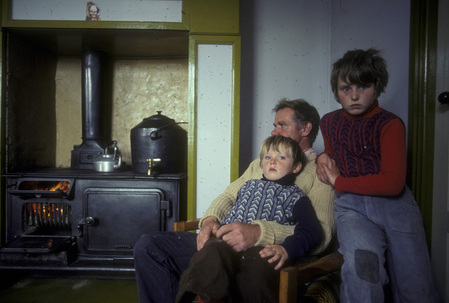
Fenton Hirtle, with son Bub and daughter Odette, at home on Golding Island
Far to the north, just off the edge of West Falkland, Fenton Hirtle is planting tree seedlings in front of his family's new home, the only house on Golding Island.
''I've saved years for a place like this," he says.
His house is old and his pastures poor, but they answer a lifetime dream, not just for Fenton but for many others. For more than half his 40 years, Fenton had done every sort of farm job from laborer to acting manager. Always he looked for land. Until Golding Island was sold recently by a big company, no new farmland had gone on the market for 20 years. Large landholders have argued that small farms are not viable, despite the good health of the few in existence.
In roughly the same two decades, the Falkland population has suffered the only serious decline in its history, falling by more than 400 since the mid-1950s. "Ten families left the colony just last year," he says, "and we'd have been off too, for New Zealand. There I knew I could buy a farm."
Then Golding and eight neighboring islets went on sale. The price was £18,500, not easily saved in a land where the average income in I979 was £2,910 ($6,170). The Hirtle family paid cash.
"There's so many people," said Fenton, "who just want their small hold in the colony. There's so much to do--soil to improve, trees to plant. But people have got to believe that if they plant a tree they'll be able to watch it grow."
I had to stay two weeks more than planned on Golding, waiting while the Falklands' planes kept conking out and the 40-knot "woollies" blew, keeping the sea in froth. The Hirtles never complained as my visit became a layover. Finally the wind slackened, and I was off to Stanley, the capital.
''I've saved years for a place like this," he says.
His house is old and his pastures poor, but they answer a lifetime dream, not just for Fenton but for many others. For more than half his 40 years, Fenton had done every sort of farm job from laborer to acting manager. Always he looked for land. Until Golding Island was sold recently by a big company, no new farmland had gone on the market for 20 years. Large landholders have argued that small farms are not viable, despite the good health of the few in existence.
In roughly the same two decades, the Falkland population has suffered the only serious decline in its history, falling by more than 400 since the mid-1950s. "Ten families left the colony just last year," he says, "and we'd have been off too, for New Zealand. There I knew I could buy a farm."
Then Golding and eight neighboring islets went on sale. The price was £18,500, not easily saved in a land where the average income in I979 was £2,910 ($6,170). The Hirtle family paid cash.
"There's so many people," said Fenton, "who just want their small hold in the colony. There's so much to do--soil to improve, trees to plant. But people have got to believe that if they plant a tree they'll be able to watch it grow."
I had to stay two weeks more than planned on Golding, waiting while the Falklands' planes kept conking out and the 40-knot "woollies" blew, keeping the sea in froth. The Hirtles never complained as my visit became a layover. Finally the wind slackened, and I was off to Stanley, the capital.
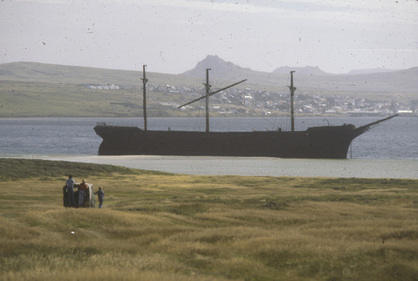
Lady Elizabeth, long aground, Stanley harbor
By the end of the harbor as we fly in, a splendid square-rigger rests hard aground but heeling as if hard on the wind. A century old and 223 feet long, her massive yardarm still swaying in the breeze, the Lady Elizabeth recalls the time when Stanley was a port on the trade routes of the world.
Because of its fine harbor, Stanley was made the Falklands' capital in 1845, a timely choice. Three years later gold was struck in California. Hundreds of vessels, many unfit for heavy sea, set out for the aptly named Golden Gate. The first port downwind from the Horn, Stanley reaped its windfall, building a thriving industry on repairing crippled ships and marketing the salvaged cargoes of ruined ones.
But many ships that limped to Stanley were not worth the cost of repair. Condemned as unfit for the sea, they were snapped up by islanders and put to use as floating storage hulks or as beached warehouses and jetties. Now slow decay may finish the destruction.
"The ships, the 'old hulks' as they're called, are a part of the islands' heritage that Falklanders are just beginning to care about," said John Smith, a native of England who for 20 years has made Stanley his home and its ships his passion. "We want to preserve them, but it's financially beyond the resources of the colony." Leaving its past behind, I set out to explore modern Stanley. Any first-time visitor can see why families in the camp view the town's life of convenience as bordering on decadence: four pubs, two schools, 15 stores, three churches, paved streets. While most camp settlements have a "milk man" who brings milk to the door in the early mornings--packaged in cows ready to be milked--in Stanley it comes ready to drink, often packaged in old whiskey bottles.
Because of its fine harbor, Stanley was made the Falklands' capital in 1845, a timely choice. Three years later gold was struck in California. Hundreds of vessels, many unfit for heavy sea, set out for the aptly named Golden Gate. The first port downwind from the Horn, Stanley reaped its windfall, building a thriving industry on repairing crippled ships and marketing the salvaged cargoes of ruined ones.
But many ships that limped to Stanley were not worth the cost of repair. Condemned as unfit for the sea, they were snapped up by islanders and put to use as floating storage hulks or as beached warehouses and jetties. Now slow decay may finish the destruction.
"The ships, the 'old hulks' as they're called, are a part of the islands' heritage that Falklanders are just beginning to care about," said John Smith, a native of England who for 20 years has made Stanley his home and its ships his passion. "We want to preserve them, but it's financially beyond the resources of the colony." Leaving its past behind, I set out to explore modern Stanley. Any first-time visitor can see why families in the camp view the town's life of convenience as bordering on decadence: four pubs, two schools, 15 stores, three churches, paved streets. While most camp settlements have a "milk man" who brings milk to the door in the early mornings--packaged in cows ready to be milked--in Stanley it comes ready to drink, often packaged in old whiskey bottles.
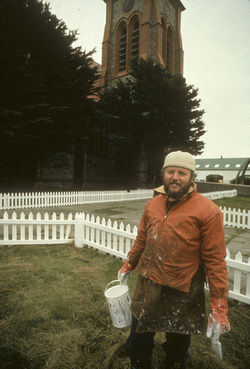
Reverend Gerald Smith, whitewashing
To walk through Stanley is to be assaulted by cheeriness and goodwill. Children stop a stranger in the street to ask who he is. Everyone bids greeting. I walk along Drury Street, down Barrack, past tidy homes silver with green and blue trim, pink and beige with orange and yellow trim--made vivid by creative paint. Near the town's center towers the world's southernmost Anglican cathedral. On the ground beneath its spire, whitewashing the fence that surrounds Christ Church Cathedral, kneels the Reverend Gerald Smith, its rector. "Clergyman's knee doesn't result from too much saying of prayers," he tells me. "It comes from too much painting of fences."
Toward the west end of town stands Government House, home and offices for Governor James R. W. Parker. "My role here," he tells me, "is as a sort of autocrat." The governor, widely respected in the islands, presides over meetings of the Falklands' two governing councils, whose members are popularly elected. "We have a system that is almost wholly democratic," he says, "except that of course I am appointed by the Queen."
Toward the west end of town stands Government House, home and offices for Governor James R. W. Parker. "My role here," he tells me, "is as a sort of autocrat." The governor, widely respected in the islands, presides over meetings of the Falklands' two governing councils, whose members are popularly elected. "We have a system that is almost wholly democratic," he says, "except that of course I am appointed by the Queen."
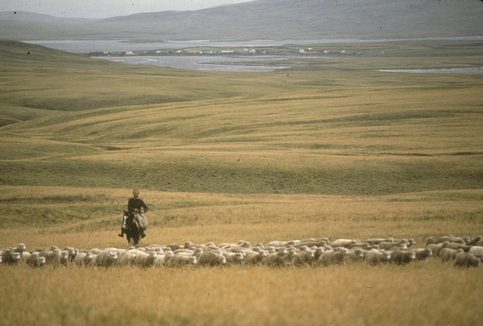
Richard Cockwell gathers at Little Chartres, uphill from Chartres settlement
Much of the work of island government, quite understandably, is limited to the allotting of slim revenues. The British government sends some financial assistance but, at least until recently, the taxes paid directly to the British exchequer, on income derived from Falkland farms by British companies and their shareholders, have exceeded all support returned by Great Britain to the islands. That is, possession of the Falklands has not only yielded Britain a naval outpost but yielded a profit as well.
Now, however, particularly as speculation arises about oil deposits beneath the seas around them and as Britain and Argentina meet regularly to discuss the islands' sovereignty and economic development, Falklanders have come to fear that Britain will trade them away, perhaps partly in exchange for a profitable arrangement by the two nations for oil exploration. Falklanders have made it clear that they wish to remain under the British rule, and Parliament ministers have given assurances that no change will occur that is unacceptable to the islanders. Still, the sovereignty talks continue.
"The greatest threat to these islands," one farm manager told me, "is continued uncertainty. Once there is a decision, even say that in 20 years there will be a handover to Argentina, then at least people can decide what to do. Of course most would leave, but there are some who might remain."
For now, what remains is the uncertainty. Falklanders must live with their odd lot--that hard work can bring self-reliance but, apparently, no independence. They are simply too small, and suspended between two powers--the alien "coast" and the faraway "home"--that are too great.
One thing is certain. Those who leave the Falklands, for whatever reason, will not easily forget them. I think back to one morning at North Arm, spent riding with Lynn Blake across the open land at dawn as skeins of whistling upland geese flew by, over rippling golden plains toward the midnight blue ocean beyond. "The longer we stay," Lynn said, "the harder it is to leave. I love the life, love the space, love the miles. Of course there are squally days, storms. You never know if you'll be off for a picnic or just sitting by the fire. But when people use words like 'barren' and 'windswept,' to me they just fire the imagination."
Now, however, particularly as speculation arises about oil deposits beneath the seas around them and as Britain and Argentina meet regularly to discuss the islands' sovereignty and economic development, Falklanders have come to fear that Britain will trade them away, perhaps partly in exchange for a profitable arrangement by the two nations for oil exploration. Falklanders have made it clear that they wish to remain under the British rule, and Parliament ministers have given assurances that no change will occur that is unacceptable to the islanders. Still, the sovereignty talks continue.
"The greatest threat to these islands," one farm manager told me, "is continued uncertainty. Once there is a decision, even say that in 20 years there will be a handover to Argentina, then at least people can decide what to do. Of course most would leave, but there are some who might remain."
For now, what remains is the uncertainty. Falklanders must live with their odd lot--that hard work can bring self-reliance but, apparently, no independence. They are simply too small, and suspended between two powers--the alien "coast" and the faraway "home"--that are too great.
One thing is certain. Those who leave the Falklands, for whatever reason, will not easily forget them. I think back to one morning at North Arm, spent riding with Lynn Blake across the open land at dawn as skeins of whistling upland geese flew by, over rippling golden plains toward the midnight blue ocean beyond. "The longer we stay," Lynn said, "the harder it is to leave. I love the life, love the space, love the miles. Of course there are squally days, storms. You never know if you'll be off for a picnic or just sitting by the fire. But when people use words like 'barren' and 'windswept,' to me they just fire the imagination."
# # # # #
